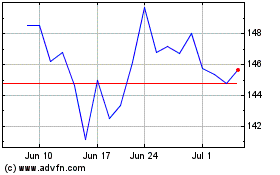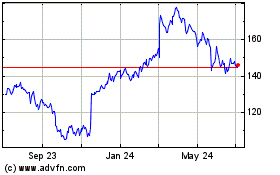Target Boosts Growth During Covid-19 Pandemic, at Rivals' Expense -- 2nd Update
March 02 2021 - 1:32PM
Dow Jones News
By Sarah Nassauer
Covid-19 helped Target Corp. get much bigger.
Target said Tuesday that holiday sales rose solidly, capping off
a year when the Minneapolis-based retailer increased revenue by
more than it had in the previous 11 years combined.
Comparable sales, those from stores and digital channels
operating for at least 12 months, rose nearly 21% in the fiscal
quarter ended Jan. 30, boosted by strong demand for online
services, including same-day order pickup and delivery. For the
full fiscal year, revenue hit $93.6 billion, a nearly 20%
increase.
"Following years of investment to build a durable, scalable and
sustainable business model, we saw record growth in 2020," said
Chief Executive Brian Cornell.
In recent years Target has ramped up investments in online
services. Instead of spending heavily to establish a massive
network of online fulfillment warehouses, Target has used stores as
hubs to ship online orders or allow shoppers to pick up their
orders from store parking lots.
Over the past fiscal year around 95% of sales came from store
fulfillment, which includes products bought in stores as well as
online orders fulfilled from stores, the company said. Digital
comparable sales -- orders placed online or through the Target app
-- more than doubled in the most recent quarter.
That model, as well as selling products in high demand during
the pandemic such as home décor, food and toilet paper, helped
Target grab market share over the past year. Target, along with
many big-box retailers, remained open in the early days of the
pandemic while department stores and apparel retailers had to close
to in-store shoppers. Target said Tuesday that it estimates it
gained around $9 billion in sales from competitors.
Target's profit surged last year despite a jump in Covid-19
related expenses that remain elevated, executives said. As sales
grew quickly, "our gross margin rate also increased and we saw a
jaw-dropping amount of leverage" on expenses, said company finance
chief Michael Fiddelke on a call with analysts. That growth "more
than offset investments in team and guest safety," he said.
In the most recent quarter net earnings hit $1.38 billion, up
66% from the year-earlier period. Earnings per share were $2.67,
compared with $1.69 a year earlier.
Target said it plans to ramp up store remodels and other
investments this year after having paused some of those activities
early in the pandemic. It said it would spend around $4 billion
annually in the next few years. Its plans include remodeling 150
stores before the holidays this year and 200 a year in the coming
years, as well as building around 35 new small-format stores each
year, mostly in urban areas and college campuses.
Target's store brands grew quickly last year, said executives,
accounting for about a third of revenue and a higher percentage of
gross margin.
Like other retailers that have fared well in the pandemic,
Target became more e-commerce-dependent because of the disruption.
For the full fiscal year, 18% of sales came from digital channels,
up from 8.8% a year earlier. Last week Best Buy Co. said its online
sales rose almost 90% to $6.7 billion in the most recent quarter
and made up 43% of total U.S. sales, nearly double the share a year
earlier.
Retailers have reported mixed results over the past year. Last
week Home Depot Inc. said revenue rose 20% in its latest fiscal
year as Americans spent heavily to fix up homes. Annual sales at
Macy's Inc. fell nearly 30% amid weak demand for outside-the-home
apparel.
Some retailers say pandemic-induced buying trends will persist
longer term, while other industry executives say shoppers will
return to prior patterns later this year, as more people are
vaccinated and resume spending on dining out or travel.
Target executives said they expect some consumer demand to
rebound, such as buying clothing to wear outside the home or
luggage for travel. But sensitivity to germs and preference for
social distancing may stick around longer term, Mr. Cornell said on
a call with reporters.
Target said Tuesday it wouldn't share financial guidance for the
current year, citing "the highly fluid and uncertain outlook for
consumer shopping patterns and the impact of Covid-19." Many
companies stopped issuing financial guidance last year, citing
pandemic-related uncertainty.
Write to Sarah Nassauer at sarah.nassauer@wsj.com
(END) Dow Jones Newswires
March 02, 2021 13:17 ET (18:17 GMT)
Copyright (c) 2021 Dow Jones & Company, Inc.
Target (NYSE:TGT)
Historical Stock Chart
From Mar 2024 to Apr 2024

Target (NYSE:TGT)
Historical Stock Chart
From Apr 2023 to Apr 2024
